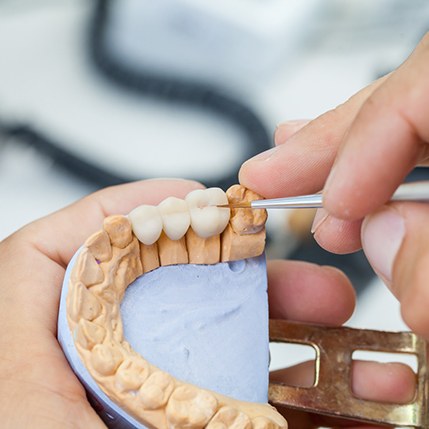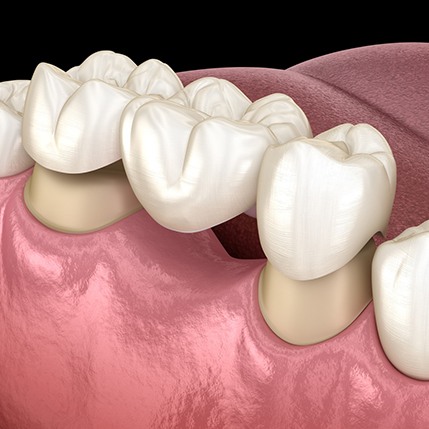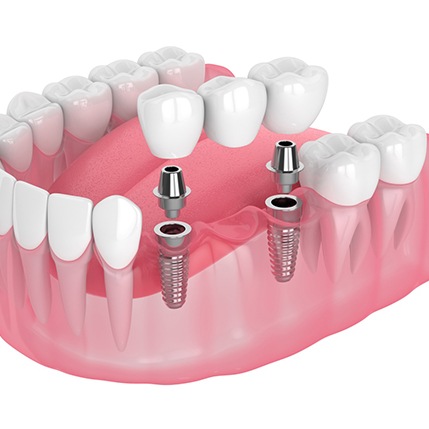Dental Bridges – Catonsville, MD
Efficient & Strong Tooth Replacement
If you're looking to remedy a gap caused by a missing tooth, ask us about dental bridges. Bridges are an excellent option for Catonsville patients who want a permanent fix for mild to moderate tooth loss. They are durable, aesthetically pleasing, and cost-effective. To learn more about this efficient and strong form of tooth replacement, get in touch with Advance Dental Clinic today to book your restorative dentistry consultation. We look forward to serving you!
Why Choose Advance Dental Clinic for Dental Bridges?
- Lifelike Materials for Beautiful Results
- Experienced & Caring Dentist
- Compassionate & Detail-Oriented Team
What Is a Dental Bridge?

Dental bridges are designed to fit over the teeth on either side of a gap, effectively creating a "bridge" of sorts in your mouth. In the middle of this bridge goes one or more prosthetic teeth, which are called pontics. Most bridges are ceramic, though some dentists use other materials.
Bridges are a great option for patients who have lost 1 – 3 teeth in a row. If your tooth loss is more extensive, you might need to explore other treatment possibilities.
Types of Dental Bridges

When most people talk about dental bridges, they are focusing on traditional bridges, which are also called fixed bridges. However, there are other forms of this restoration. During your consultation, we will give you a treatment recommendation based on your oral health, budget, and personal preferences. Then, we will install the type of bridge that best fits your unique situation. You might end up with either a traditional bridge or an implant bridge.
Traditional Dental Bridges
A traditional bridge has a crown on each end. The crowns are placed on the abutment teeth (the teeth on either side of a gap) so they can support one or more artificial teeth. Traditional bridges are strong and relatively affordable. They can also provide very pleasing aesthetics.
Implant Bridges
An implant bridge is not supported by your natural teeth. Rather, it is secured in the mouth via prosthetic tooth roots (dental implants) on each end of a gap. An implant bridge is one of the strongest forms of tooth replacement. Many patients love that it does not require any modification of their natural teeth.
The Benefits of Getting a Dental Bridge

When you get a dental bridge, you can experience a number of benefits:
- It will be easier and more comfortable for you to enjoy a wide variety of foods.
- A bridge can prevent your remaining natural teeth from drifting out of place.
- You may enjoy greater confidence when you smile, especially if your missing tooth was toward the front of your mouth.
- You may experience a reduced risk of oral health problems, such as gum irritation and future tooth loss.
Are you missing one or more teeth? Our team is ready to help! Book a consultation with us today.
Dental Bridges FAQs
What Are Dental Bridges Made From?
In the past, dentists used metal amalgam mixtures to build restorations like dental bridges, fillings, and crowns. These materials are incredibly durable and can withstand the daily pressure of biting and chewing, but many people are allergic.
Thanks to more recent advancements in dental technology and techniques, these restorations are now more comfortable and realistic than ever before. Dr. Bemani can provide a lifelike bridge made from tooth-colored ceramic that reflects light like enamel. Not only that, but the resilient porcelain can be customized to be just the right shape, size, and shade to match your natural teeth for a seamless smile.
Are Dental Bridges Removable?
Many people wonder whether dental bridges function like dentures that are intended to be removed and reinserted for cleanings. This may be partly because some patients have heard of partial dentures being referred to as “removable bridges”.
Although both treatments utilize lifelike materials to close the gaps in your grin, they’re very different types of restorations. Partial dentures can replace teeth sporadically throughout your mouth and anchor to healthy pearly whites via metallic clips placed in the acrylic foundation.
Meanwhile, your dental bridge contains the correct number of pontics (artificial teeth) to replace one to four consecutively missing teeth and isn’t intended to be taken out after it’s cemented in place.
Does it Hurt to Get a Dental Bridge?
It’s natural to want to avoid procedures that might hurt, and Dr. Bemani understands that you might be feeling anxious about placing your dental bridge. Rest assured, our team in Catonsville will do everything we can to help you feel comfortable and relaxed throughout your visit.
For example, we’ll apply a local anesthetic to numb the area before preparing your teeth for impressions to build your customized replacements. We also offer both nitrous oxide (laughing gas) and oral conscious sedation options to ease your frayed nerves during your procedure.
How Long Do Dental Bridges Usually Last?
Typically, you can expect your prosthetic to last anywhere from 5 to 15+ years, though it depends significantly on your unique circumstances. For instance, bridges over back teeth sustain added pressure from biting and chewing and may wear down faster.
Your bridge is more likely to last longer if you brush and floss twice daily to prevent cavities and gum disease that can erode the underlying teeth and cause it to fail. You can also keep your restoration in great shape by avoiding overly dark, crunchy, hard, or sticky foods that could break or destabilize it, and visiting Dr. Bemani every six months for a routine checkup and cleaning.
